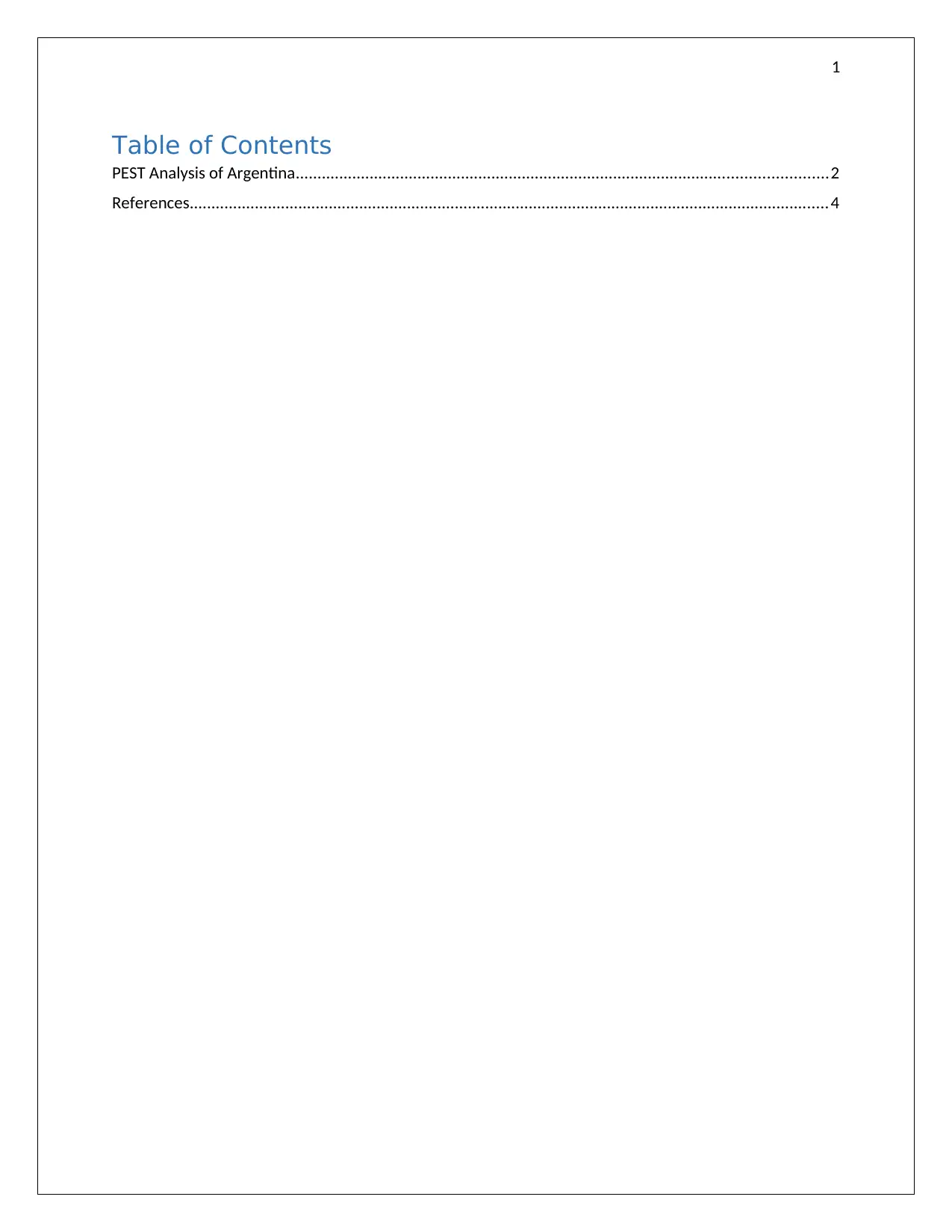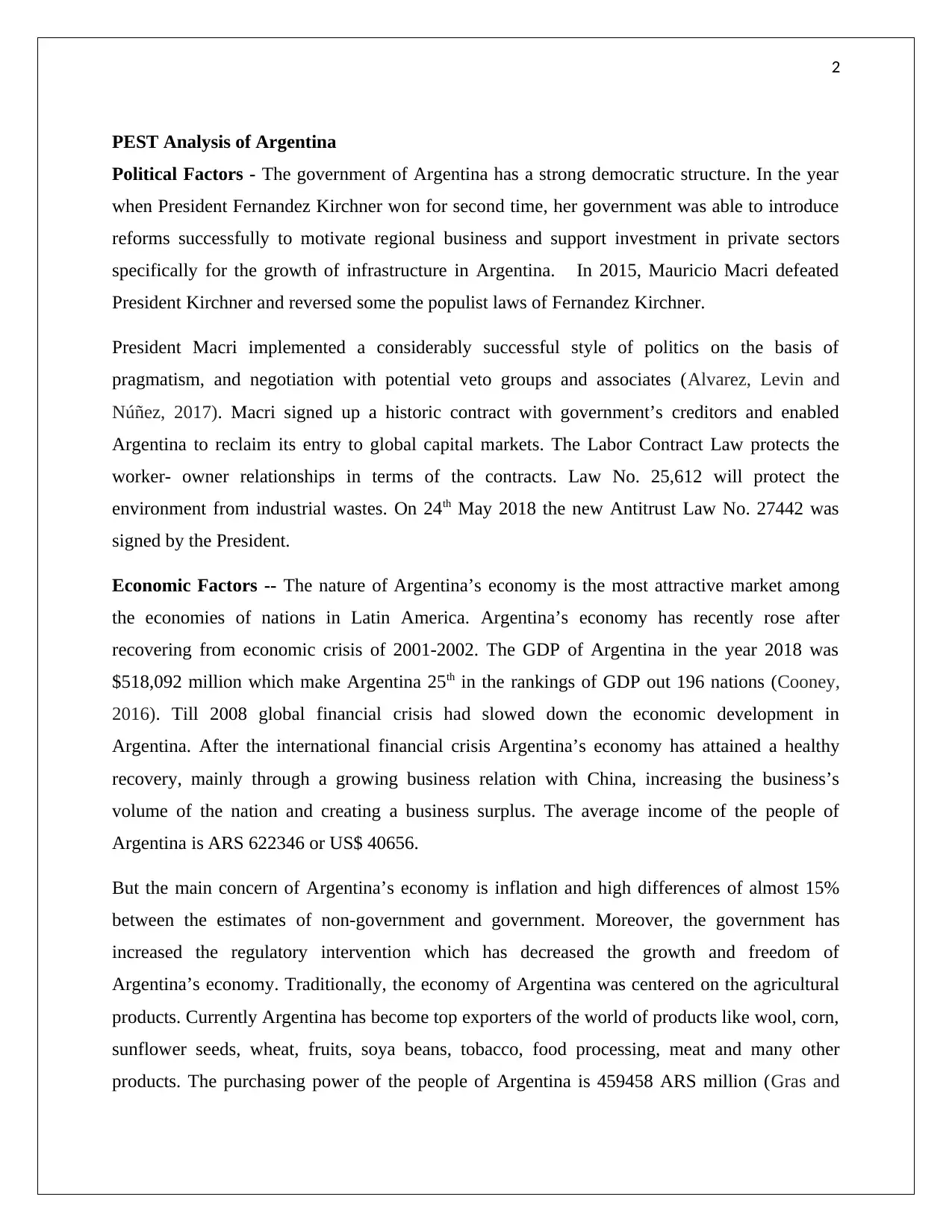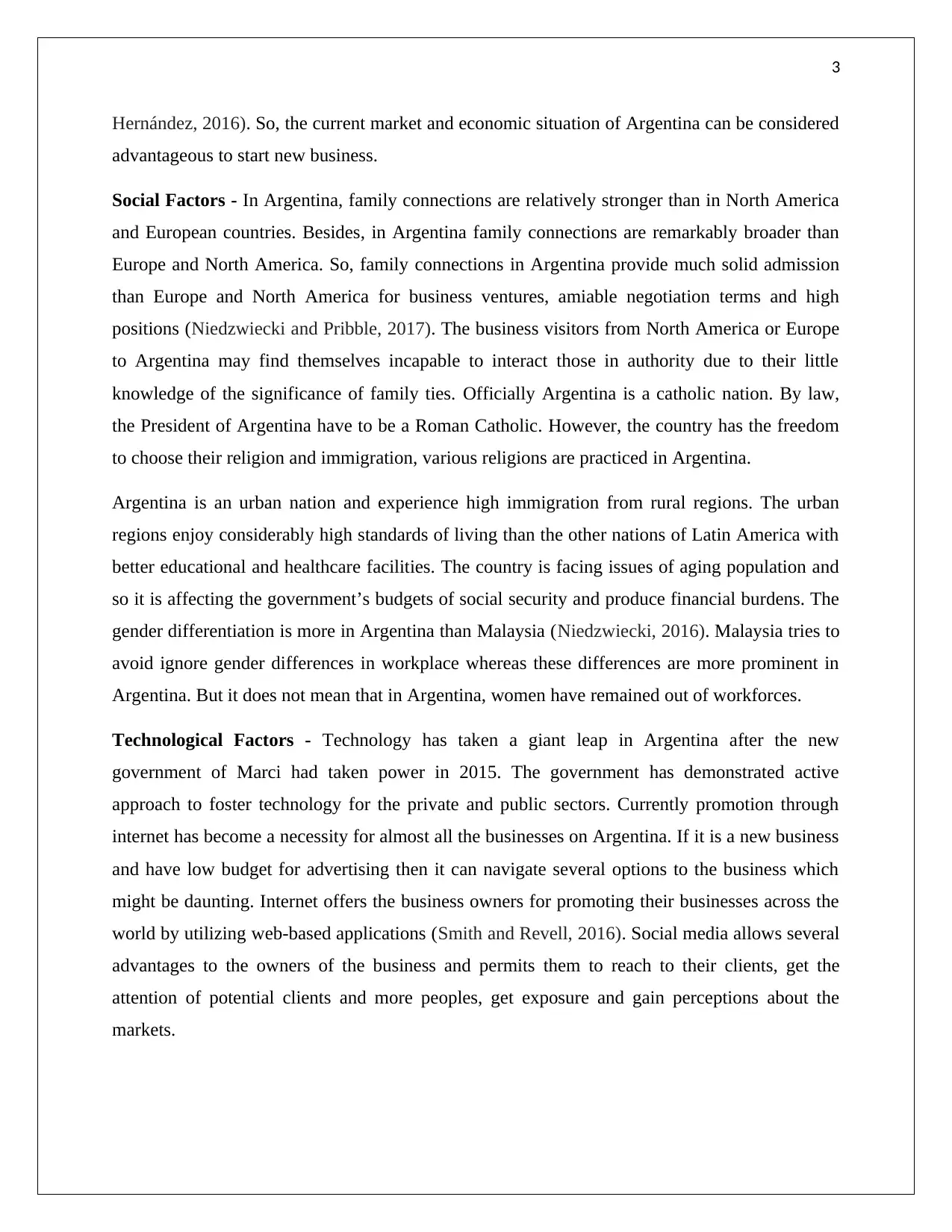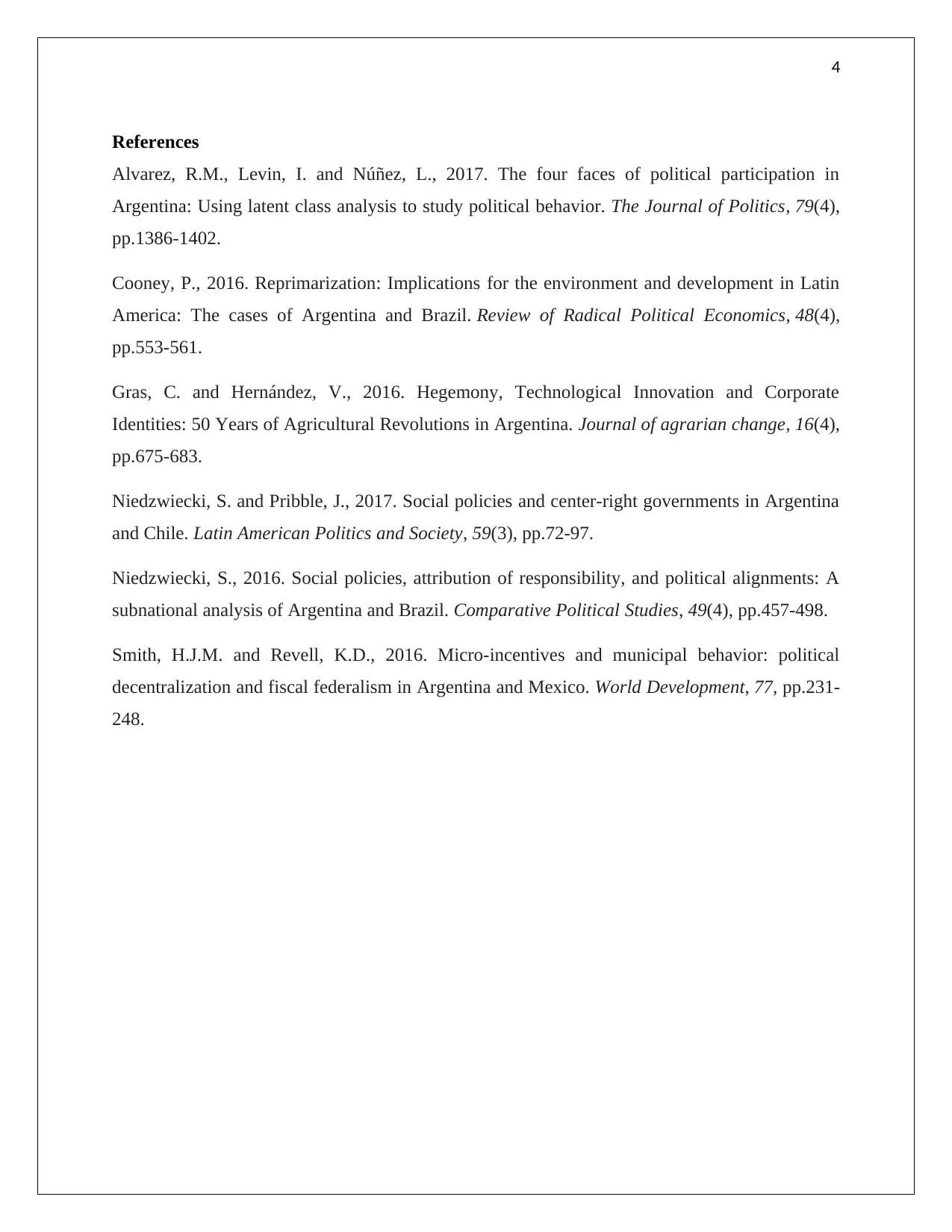Marketing Consumer Behavior: Argentina PEST Analysis and Strategy
VerifiedAdded on 2023/01/18
|5
|1097
|40
Report
AI Summary
This report presents a PEST (Political, Economic, Social, and Technological) analysis of Argentina, examining the country's market environment for a business proposal. It delves into the political landscape, highlighting democratic structures, government reforms, and legal frameworks affecting business operations. The economic section assesses Argentina's GDP, inflation, income levels, and key industries like agriculture, emphasizing the market's attractiveness and potential challenges. Social factors are explored, including family connections, cultural values, demographics, and the impact of an aging population. The technological analysis focuses on the country's adoption of technology, particularly the growth of internet and social media. The report connects these external factors to consumer behavior, touching upon perception, learning, motivation, personality, attitudes, and self-concept in the context of marketing strategies for the introduction of a new breakfast cereal. The analysis is supported by references to relevant academic sources.

Marketing Consumer Behavior
Student’s Name:
Student’s ID:
Student’s Name:
Student’s ID:
Paraphrase This Document
Need a fresh take? Get an instant paraphrase of this document with our AI Paraphraser

1
Table of Contents
PEST Analysis of Argentina..........................................................................................................................2
References...................................................................................................................................................4
Table of Contents
PEST Analysis of Argentina..........................................................................................................................2
References...................................................................................................................................................4

2
PEST Analysis of Argentina
Political Factors - The government of Argentina has a strong democratic structure. In the year
when President Fernandez Kirchner won for second time, her government was able to introduce
reforms successfully to motivate regional business and support investment in private sectors
specifically for the growth of infrastructure in Argentina. In 2015, Mauricio Macri defeated
President Kirchner and reversed some the populist laws of Fernandez Kirchner.
President Macri implemented a considerably successful style of politics on the basis of
pragmatism, and negotiation with potential veto groups and associates (Alvarez, Levin and
Núñez, 2017). Macri signed up a historic contract with government’s creditors and enabled
Argentina to reclaim its entry to global capital markets. The Labor Contract Law protects the
worker- owner relationships in terms of the contracts. Law No. 25,612 will protect the
environment from industrial wastes. On 24th May 2018 the new Antitrust Law No. 27442 was
signed by the President.
Economic Factors -- The nature of Argentina’s economy is the most attractive market among
the economies of nations in Latin America. Argentina’s economy has recently rose after
recovering from economic crisis of 2001-2002. The GDP of Argentina in the year 2018 was
$518,092 million which make Argentina 25th in the rankings of GDP out 196 nations (Cooney,
2016). Till 2008 global financial crisis had slowed down the economic development in
Argentina. After the international financial crisis Argentina’s economy has attained a healthy
recovery, mainly through a growing business relation with China, increasing the business’s
volume of the nation and creating a business surplus. The average income of the people of
Argentina is ARS 622346 or US$ 40656.
But the main concern of Argentina’s economy is inflation and high differences of almost 15%
between the estimates of non-government and government. Moreover, the government has
increased the regulatory intervention which has decreased the growth and freedom of
Argentina’s economy. Traditionally, the economy of Argentina was centered on the agricultural
products. Currently Argentina has become top exporters of the world of products like wool, corn,
sunflower seeds, wheat, fruits, soya beans, tobacco, food processing, meat and many other
products. The purchasing power of the people of Argentina is 459458 ARS million (Gras and
PEST Analysis of Argentina
Political Factors - The government of Argentina has a strong democratic structure. In the year
when President Fernandez Kirchner won for second time, her government was able to introduce
reforms successfully to motivate regional business and support investment in private sectors
specifically for the growth of infrastructure in Argentina. In 2015, Mauricio Macri defeated
President Kirchner and reversed some the populist laws of Fernandez Kirchner.
President Macri implemented a considerably successful style of politics on the basis of
pragmatism, and negotiation with potential veto groups and associates (Alvarez, Levin and
Núñez, 2017). Macri signed up a historic contract with government’s creditors and enabled
Argentina to reclaim its entry to global capital markets. The Labor Contract Law protects the
worker- owner relationships in terms of the contracts. Law No. 25,612 will protect the
environment from industrial wastes. On 24th May 2018 the new Antitrust Law No. 27442 was
signed by the President.
Economic Factors -- The nature of Argentina’s economy is the most attractive market among
the economies of nations in Latin America. Argentina’s economy has recently rose after
recovering from economic crisis of 2001-2002. The GDP of Argentina in the year 2018 was
$518,092 million which make Argentina 25th in the rankings of GDP out 196 nations (Cooney,
2016). Till 2008 global financial crisis had slowed down the economic development in
Argentina. After the international financial crisis Argentina’s economy has attained a healthy
recovery, mainly through a growing business relation with China, increasing the business’s
volume of the nation and creating a business surplus. The average income of the people of
Argentina is ARS 622346 or US$ 40656.
But the main concern of Argentina’s economy is inflation and high differences of almost 15%
between the estimates of non-government and government. Moreover, the government has
increased the regulatory intervention which has decreased the growth and freedom of
Argentina’s economy. Traditionally, the economy of Argentina was centered on the agricultural
products. Currently Argentina has become top exporters of the world of products like wool, corn,
sunflower seeds, wheat, fruits, soya beans, tobacco, food processing, meat and many other
products. The purchasing power of the people of Argentina is 459458 ARS million (Gras and
⊘ This is a preview!⊘
Do you want full access?
Subscribe today to unlock all pages.

Trusted by 1+ million students worldwide

3
Hernández, 2016). So, the current market and economic situation of Argentina can be considered
advantageous to start new business.
Social Factors - In Argentina, family connections are relatively stronger than in North America
and European countries. Besides, in Argentina family connections are remarkably broader than
Europe and North America. So, family connections in Argentina provide much solid admission
than Europe and North America for business ventures, amiable negotiation terms and high
positions (Niedzwiecki and Pribble, 2017). The business visitors from North America or Europe
to Argentina may find themselves incapable to interact those in authority due to their little
knowledge of the significance of family ties. Officially Argentina is a catholic nation. By law,
the President of Argentina have to be a Roman Catholic. However, the country has the freedom
to choose their religion and immigration, various religions are practiced in Argentina.
Argentina is an urban nation and experience high immigration from rural regions. The urban
regions enjoy considerably high standards of living than the other nations of Latin America with
better educational and healthcare facilities. The country is facing issues of aging population and
so it is affecting the government’s budgets of social security and produce financial burdens. The
gender differentiation is more in Argentina than Malaysia (Niedzwiecki, 2016). Malaysia tries to
avoid ignore gender differences in workplace whereas these differences are more prominent in
Argentina. But it does not mean that in Argentina, women have remained out of workforces.
Technological Factors - Technology has taken a giant leap in Argentina after the new
government of Marci had taken power in 2015. The government has demonstrated active
approach to foster technology for the private and public sectors. Currently promotion through
internet has become a necessity for almost all the businesses on Argentina. If it is a new business
and have low budget for advertising then it can navigate several options to the business which
might be daunting. Internet offers the business owners for promoting their businesses across the
world by utilizing web-based applications (Smith and Revell, 2016). Social media allows several
advantages to the owners of the business and permits them to reach to their clients, get the
attention of potential clients and more peoples, get exposure and gain perceptions about the
markets.
Hernández, 2016). So, the current market and economic situation of Argentina can be considered
advantageous to start new business.
Social Factors - In Argentina, family connections are relatively stronger than in North America
and European countries. Besides, in Argentina family connections are remarkably broader than
Europe and North America. So, family connections in Argentina provide much solid admission
than Europe and North America for business ventures, amiable negotiation terms and high
positions (Niedzwiecki and Pribble, 2017). The business visitors from North America or Europe
to Argentina may find themselves incapable to interact those in authority due to their little
knowledge of the significance of family ties. Officially Argentina is a catholic nation. By law,
the President of Argentina have to be a Roman Catholic. However, the country has the freedom
to choose their religion and immigration, various religions are practiced in Argentina.
Argentina is an urban nation and experience high immigration from rural regions. The urban
regions enjoy considerably high standards of living than the other nations of Latin America with
better educational and healthcare facilities. The country is facing issues of aging population and
so it is affecting the government’s budgets of social security and produce financial burdens. The
gender differentiation is more in Argentina than Malaysia (Niedzwiecki, 2016). Malaysia tries to
avoid ignore gender differences in workplace whereas these differences are more prominent in
Argentina. But it does not mean that in Argentina, women have remained out of workforces.
Technological Factors - Technology has taken a giant leap in Argentina after the new
government of Marci had taken power in 2015. The government has demonstrated active
approach to foster technology for the private and public sectors. Currently promotion through
internet has become a necessity for almost all the businesses on Argentina. If it is a new business
and have low budget for advertising then it can navigate several options to the business which
might be daunting. Internet offers the business owners for promoting their businesses across the
world by utilizing web-based applications (Smith and Revell, 2016). Social media allows several
advantages to the owners of the business and permits them to reach to their clients, get the
attention of potential clients and more peoples, get exposure and gain perceptions about the
markets.
Paraphrase This Document
Need a fresh take? Get an instant paraphrase of this document with our AI Paraphraser

4
References
Alvarez, R.M., Levin, I. and Núñez, L., 2017. The four faces of political participation in
Argentina: Using latent class analysis to study political behavior. The Journal of Politics, 79(4),
pp.1386-1402.
Cooney, P., 2016. Reprimarization: Implications for the environment and development in Latin
America: The cases of Argentina and Brazil. Review of Radical Political Economics, 48(4),
pp.553-561.
Gras, C. and Hernández, V., 2016. Hegemony, Technological Innovation and Corporate
Identities: 50 Years of Agricultural Revolutions in Argentina. Journal of agrarian change, 16(4),
pp.675-683.
Niedzwiecki, S. and Pribble, J., 2017. Social policies and center-right governments in Argentina
and Chile. Latin American Politics and Society, 59(3), pp.72-97.
Niedzwiecki, S., 2016. Social policies, attribution of responsibility, and political alignments: A
subnational analysis of Argentina and Brazil. Comparative Political Studies, 49(4), pp.457-498.
Smith, H.J.M. and Revell, K.D., 2016. Micro-incentives and municipal behavior: political
decentralization and fiscal federalism in Argentina and Mexico. World Development, 77, pp.231-
248.
References
Alvarez, R.M., Levin, I. and Núñez, L., 2017. The four faces of political participation in
Argentina: Using latent class analysis to study political behavior. The Journal of Politics, 79(4),
pp.1386-1402.
Cooney, P., 2016. Reprimarization: Implications for the environment and development in Latin
America: The cases of Argentina and Brazil. Review of Radical Political Economics, 48(4),
pp.553-561.
Gras, C. and Hernández, V., 2016. Hegemony, Technological Innovation and Corporate
Identities: 50 Years of Agricultural Revolutions in Argentina. Journal of agrarian change, 16(4),
pp.675-683.
Niedzwiecki, S. and Pribble, J., 2017. Social policies and center-right governments in Argentina
and Chile. Latin American Politics and Society, 59(3), pp.72-97.
Niedzwiecki, S., 2016. Social policies, attribution of responsibility, and political alignments: A
subnational analysis of Argentina and Brazil. Comparative Political Studies, 49(4), pp.457-498.
Smith, H.J.M. and Revell, K.D., 2016. Micro-incentives and municipal behavior: political
decentralization and fiscal federalism in Argentina and Mexico. World Development, 77, pp.231-
248.
1 out of 5
Related Documents
Your All-in-One AI-Powered Toolkit for Academic Success.
+13062052269
info@desklib.com
Available 24*7 on WhatsApp / Email
![[object Object]](/_next/static/media/star-bottom.7253800d.svg)
Unlock your academic potential
Copyright © 2020–2025 A2Z Services. All Rights Reserved. Developed and managed by ZUCOL.





